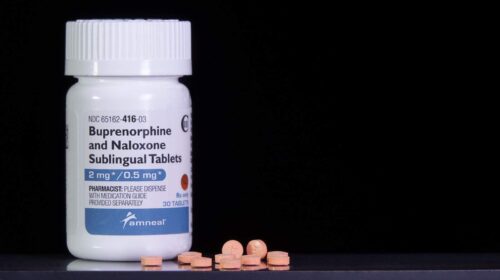A methadone clinic is a medical and behavioral health facility that provides medication-assisted treatment for those suffering from opioid use disorder. During treatment, patients receive low doses of methadone to relieve withdrawal symptoms, reduce cravings, and help them taper off more harmful painkillers or opioids safely and sustainably.
History of Methadone Clinics In The U.S.
Methadone has been used for treating opioid dependence since the 1960s. However, because Methadone is an opioid itself, it’s highly regulated for the safety of those taking it. One way the FDA does this is by restricting the dispensing of Methadone to licensed centers known as Methadone Clinics. These clinics are staffed by highly trained physicians and staff experienced in helping individuals overcome addiction with the help of medication.
Recovery Unplugged is a licensed “Medication Assisted Treatment” facility, which means we use FDA-approved medications to help our patients by reducing withdrawal symptoms and cravings. We’ve found that those seeking recovery often benefit from the effective combination of medication and behavioral rehab, and at Recovery Unplugged, we also believe in the power of music. Our MAT programs include cognitive behavioral therapy, suboxone (buprenorphine with naltrexone), and other outpatient treatment services tailored to your needs.
Details of A Methadone Clinic
Methadone is approved by the FDA to treat pain management and has been proven to be safe and effective when taken as prescribed.[1] However, since it can be addictive, patients must receive their dosage from a licensed provider. Methadone clinics see patients daily to dispense Methadone in a controlled environment.
Studies have shown the benefits of Methadone greatly outweigh the potential risks.[2] They include:
- Reduced injection of illegal substances
- Lower HIV transmission
- Significantly lower death rates related to opioid usage
- Reduced criminal activity for opioids
While it is true that Methadone Clinics carry a certain stigma, the positive effects of the medication can’t be denied. As with any medication, the key is to ensure that the drug is administered safely and that usage is monitored closely.
Methadone Drug Facts
Methadone is a synthetic opioid first synthesized by German scientists during World War II as a painkiller. When the rise in heroin addiction hit the United States, Methadone was used to reduce cravings and withdrawal symptoms.
Methadone can help individuals resist the urge to take illegal substances by shortening and weakening the typical withdrawal timeline of opioids. When taken properly, the craving for drugs can be suppressed for 24 to 36 hours and is usually taken for at least one year in what’s called Methadone Maintenance Treatment or MMT.
How Does Methadone Work?
Methadone works by attaching to your brain’s opioid receptors at a slower rate than natural opioids do. This slower process reduces the feeling of euphoria and changes how your brain reacts to pain. When Methadone is in your system, it will block the effects of other opioids, effectively lowering the ability to achieve a high and aiding relapse prevention.
What Happens In Medication-Assisted Treatment at a Methadone Clinic?
Methadone clinics can either be public or private but are always certified and monitored by the Substance Abuse and Mental Health Services Administration and registered with the Drug Enforcement Agency. At a public clinic, you can expect to be added to a waiting list that could be days or weeks long. Private clinics often have no waiting list but can be more expensive.
Once a clinic is selected, an individual plan is set for each patient based on their background and the extent of their drug use. The length of the treatment program will be discussed, and any social, medical, and legal matters will be addressed. All mental health issues need to be uncovered during the intake process so they can be treated along with the addiction itself.
Whether private or public, the process for Methadone treatment follows the same general steps
Intake Examination: Each person receives a physical from a healthcare physician to adhere to documentation requirements.
Treatment Plan: Personalized treatment options will be discussed and typically include counseling services in addition to MAT. Private clinics often include group counseling and individual meetings with healthcare providers.
Drug testing: The frequency and requirements for drug testing in methadone treatment programs can vary based on the clinic’s policies and the patient’s treatment plan.
Once these steps are taken, individuals are given Methadone as opioid treatment at the facility on a daily basis for, at minimum, one year. Most clinics administer dosages in liquid form or tabs instead of pills. The actual dosage will vary based on the individual’s tolerance and prior drug usage. This dosage will be adjusted over the course of a year and tapered off once recovery is achieved and it’s time for the patient to end their treatment program.
Who Is Methadone Treatment Therapy For?
Methadone treatment is potentially for anyone wanting to overcome opioid addiction and illicit drug use in a controlled environment. The treatment is ideal for anyone struggling to overcome addiction, as the dosing of methadone is based on a patient’s tolerance and needs. Eligibility for methadone treatment typically requires a history of opioid addiction, but the specific duration requirement can vary.
If you cannot prove opioid dependence for a year or more, you may qualify for an exception if you’re pregnant or recently released from prison. While less common, methadone treatment can be considered for individuals under 18 in some circumstances.
Methadone is for individuals struggling with long-term addiction to illicit drugs such as
- Oxymorphone
- Hydrocodone
- Oxycodone
- Morphine
- Heroin
- Codeine
Official Data On Medication-Assisted Treatment and Recovery Outcomes
Medication-Assisted Treatment programs are regulated by the Substance Abuse and Mental Health Services Administration (SAMHSA) and cover treatment facilities using FDA-approved medications to help treat opioid addiction.
Studies have shown promising results of the use of methadone in opioid treatment programs [3], such as
- Heroin usage drops to less than 40% of pretreatment levels in the first year.
- Usage drops to 15% after two or more years of methadone treatment.
- Individual functioning is approved.
- Consumption of all illicit drugs declines
- HIV transmission is reduced due to less usage of needles.
What Therapies Go Along With Treatment At A Methadone Clinic?
Methadone clinics should always offer a combination of therapies for opioid addiction treatment. These typically include cognitive behavior therapy, group counseling sessions, and individual case management. At Recovery Unplugged, we set ourselves apart by incorporating the power of music whenever possible in our therapy sessions.
Utilizing various modalities of therapy ensures that a patient is treating their addiction from a holistic standpoint. Addiction is rarely a disorder that acts alone. Most people struggling with substance use disorder also have mental health issues that need to be fully addressed to achieve recovery. Group and individual therapies can be crucial tools in this effort and work alongside medication-assisted therapies to help patients reach their goals.
Hope and Healing at Recovery Unplugged
While the use of Methadone may not be for every person seeking recovery from opioid addiction, it has certainly been an effective tool for many since the 1960s. At Recovery Unplugged, we are passionate about finding the best way to give you hope and healing. Let our dedicated staff help you get started today by discussing the many types of treatment offered at our facilities.


























